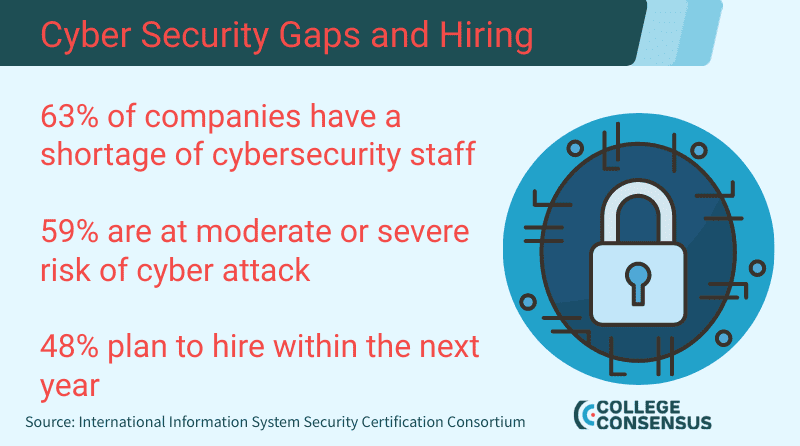Cybersecurity is the field of protecting computer systems, devices, and networks. This protection encompasses all aspects, including unauthorized access, theft, and damage to hardware, software, or data.
The risks of inadequate security can be catastrophic depending upon the nature of the computer system. Systems like government, utilities, or banking require exceptional proactive and reactive responses to security. Imagine the devastation that could occur if malicious hackers got into a classified server at an intelligence agency, for example.

So what degree is best for cyber security? In this article, we’ll discuss how you can choose the best degree for cyber security:
2. Computer Programming
3. Database Management
4. Computer Hardware Engineering
5. Network Administration
6. Cloud Computing
7. Information Technology Management
8. Information Security & Assurance
9. Computer Forensics
10. Machine Learning
Keep reading to learn more about each program.
Recommended Online Degree Programs
Explore our featured online programs to find the right match for you today.
Ready to start your journey?
What degree do you need for cyber security?
As you can see from this list, there are many aspects of cybersecurity, including devices, software, hardware, databases, networking, and more. No matter your background or interests, you’ll be able to find a degree program that fits your needs. You’ll be able to learn the foundations of computer science and specialize in one or more areas.
1. Computer Science
The most obvious choice of best degree for cyber security is computer science. You explore degree programs with an eye toward cybersecurity, the first option you’ll bump into is computer science. It’s the most common computing-related bachelor’s degree program. You’ll have no trouble finding a school that offers it.
A computer science degree program is a foundational curriculum that introduces learners to all aspects of computing. It teaches both the theory & principles of computer science as well as specific technical skills. Students will get a broad understanding of computing systems.
As a computer science student, you’ll learn about devices, systems & architecture, networks, databases, programming languages, and more.
The most common course offerings in computer science programs include:
– Mathematics
– Programming
– Algorithms
– Systems Engineering
– Artificial Intelligence
Most computer science programs also offer specializations to dig deeper into specific areas. These distinct sub-groups of computer science include cybersecurity, machine learning, software development, cloud computing, and more.
As a student interested in cybersecurity, a computer science degree will offer you a terrific foundation. You’ll get the knowledge and skills to apply to a variety of concerns in cybersecurity. If you’re thinking about graduate school to further your learnings, this program would be an excellent place to start. Your school may also provide a cybersecurity specialization.
Recommended Online Programs
Explore our featured online programs to find the right match for you today.
2. Computer Programming
Computer programming, also known as software development or software engineering, is a high-demand skill no matter what industry you’re interested in. If you’re interested in the software side of cybersecurity, this program is worth investigating.
You’ll learn how to write, debug, and compile code. Your programs will be sets of specific instructions to the computer to perform particular tasks. You’ll learn about algorithms and solving problems. You’ll learn about troubleshooting bugs and working with teams.
Here are some of the typical courses you will find:
– Data Structures
– Algorithms
– Python
– C#
– C++
– Java
As a software developer, you’ll write programs to help combat malicious activity in computer systems. You might write software to protect anything from on-premise systems to cloud networks.
You’ll also have the same knowledge that hackers have when writing malicious software like viruses or malware. This awareness will give you an edge up in protecting networks because you’ll know the means and methods they will use to attack you.
Recommended Online Programs
Explore our featured online programs to find the right match for you today.
3. Database Management
Databases contain information and data that companies collect and store. This information is valuable and critical to the success of the business. That also means it’s a key attack vector to protect in cybersecurity.
If a hacker wants to steal information, they do so from databases. If they’re going to modify or destroy data, they do so in databases. Cybersecurity software also makes use of databases to store logs and other data. Implementing, configuring, and maintaining databases, therefore, is critical in the cybersecurity field.
With a database administration degree, you’ll gain the skill and experience required to manage databases securely. You’ll learn about encryption at rest and encryption in transit. You’ll also learn about access and authorization protocols.
You’ll learn about a variety of different databases. Some of the more common ones are Oracle, Microsoft, MySQL, PostgreSQL, Cassandra, and MongoDB.
Here are some typical courses for this degree:
– Structured Query Language (SQL)
– Database Administration
– Database Security
– Data Analysis
4. Computer Hardware Engineering
Hardware engineers design, test, and evaluate computer hardware. As a computer hardware student, you’ll learn about the various hardware types that comprise computer systems. Device hardware includes things like circuit boards, CPUs, memory, and adapters. Then there is also network hardware, like routers and switches.
You’ll learn about how to build and test hardware. You’ll be able to make recommendations and perform diagnostics. You’ll work with peripherals like keyboards, mice, printers, and routers. You’ll learn about electronic circuits and assemblies.
Here are some typical hardware engineering courses:
– Microprocessors
– Mathematics
– Circuits
– Computational Structures
– Software Development
Hardware is a critical part of a computing system. Without hardware, software can’t run. Communication would be impossible. Protecting hardware is essential in cybersecurity.
5. Network Administration
Network administrators oversee the connections between devices, software, and functions. As a network administrator, you’ll be responsible for the day-to-day operation of these systems. You’ll help determine system needs, install, and support both software and hardware aspects.
In a network administration program, you’ll learn how to perform upgrades and repairs, evaluate performance, and maintain security. You’ll know how to manage users and their permissions. Also, you’ll be able to troubleshoot and solve problems that exist on the network.
As the network admin, you’ll provide technical oversight to users in the network. You’ll research new technologies and make recommendations for improvements.
Some of the courses you’ll take in network administration programs include:
– Router Configuration
– Application Deployment & Security
– VPN Technologies
– Local Area Networks
– Cloud Computing
– Infrastructure
Secure networks are critical for cybersecurity. A degree in network administration will give you the skills and knowledge required to create, protect, and maintain networks.
Ready to start your journey?
6. Cloud Computing
Cloud computing refers to on-demand computing services accessible via the Internet. These services include access to computing, storage, software, analytics, and more. Many organizations are moving more and more to cloud computing to innovate and expand their businesses.
There is a high demand for cloud computing administrators. Getting a degree in this field will equip you to manage cloud computing systems. Many degrees also prepare you for many industry certifications. The three big cloud providers are Amazon AWS, Google Cloud Platform, and Microsoft Azure.
Here are some standard courses you may take:
– Network Security
– Cloud Deployment and Operations
– Linux
– Scripting and Programming
Because cloud computing services are accessible via the Internet, security is essential. Hackers from around the world can access these computing systems if not configured correctly. As companies move from on-premise networks to the cloud, cybersecurity will be at the forefront.
7. Information Technology Management
If management is more interesting to you, this is an excellent path to explore. IT Managers are responsible for coordinating all technology resources according to the company’s needs. Managers oversee all software, hardware, networks, data, and the people who manage them.
With a management degree program, you’ll learn both technical skills and people skills. You’ll learn about operations, risk management, and team leadership.
Degrees like IT management or Management Information Systems are a mixture of computer science and business. You’ll get broad technical experience with the business side of things as well.
Some of the typical courses in this degree include:
– Economics
– Project Management
– Network and Security
– Information Systems Management
– Human Resources
– Management
Let’s face it: keeping computer systems secure is a tough job that no one can do alone. Managing teams of cybersecurity experts is a vital part of protecting those systems. This program will equip you to manage people and organizational resources.
8. Information Security & Assurance
Information security deals with protecting data and systems from unauthorized access. This activity ensures systems protect sensitive, private data. Only authorized people should be able to access the data, both digital and physical copies of it.
Information assurance deals with ensuring the general availability of data. Users of data need reliable access to the data required for their use cases. Users also require the data to be available when they need it. Not having reliable data on-demand means that business can’t achieve their desired objectives.
As a student of information security and assurance, you’ll gain the skills needed to protect, detect, and react to security threats in a network. You’ll also learn how to configure access controls and prevent unauthorized access, use, leaks, or the destruction of data.
Some typical courses for this degree program are:
– Network Security
– Cybersecurity Policy
– Ethics and Information Assurance
– Cryptography
– Risk Management
Ensuring that data is available, accessible, and reliable only to authorized users is essential in a computer system. With this degree, you’ll gain the skills and knowledge required to get started.
9. Computer Forensics
This degree program is the branch of knowledge that deals with digital evidence in media and computers. If you’re the investigative type, this program might be a good fit for you.
As a computer forensics analyst, you’ll learn how to collect, analyze, and preserve data from computing systems. You’ll learn how to recover data from corrupted or deleted hard drives. You’ll learn about data and metadata and how to extract them from various media formats. You’ll be like the crime scene investigator that uncovers every piece of evidence.
You’ll also learn about criminal law and court proceedings. You might even get called in as an expert witness in a high-profile white-collar crime case. Lawyers have used evidence from computer forensics in criminal law cases since the mid-1800s.
Typical courses in a computer forensics program are:
– Criminal Law
– Networking
– Operating Systems
– Programming Languages
– Digital Forensic Investigation Techniques
– White-Collar Crime
In a cybersecurity program, this analysis is essential to gather evidence about intruders or data leaks. You’ll be able to help your company identify bad actors and provide proof of their crimes.
10. Machine Learning
Machine learning is a branch of artificial intelligence (AI) that uses data to train algorithms and improve prediction models. These usually make use of massive data sets. Machine learning is commonplace in business today, including digital assistants, e-commerce personalization, and image recognition.
You’ll learn about regression algorithms, decision trees, and neural networks in a machine learning program. You’ll learn about the training process’s iterative nature and how to remove bias from the training. You’ll learn about both supervised, unsupervised, and semi-supervised learning.
Some typical degree program courses in machine learning include:
– Neural Networks
– Machine Learning Algorithms
– Python
– Deep Learning
– Artificial Intelligence
In cybersecurity, machine learning detects and analyses threats in real-time. If you know how to develop or train these models, you’ll be able to improve the security of your computer networks.
Why do we need cybersecurity?
Bad actors attempt to hack into systems for many reasons. Sometimes it’s to access sensitive information. Other times it may be for ransoming or extorting money from users.
Attacks to a computer system come in a variety of ways:
Hackers are people who actively attempt to exploit a system for personal gain.
Malicious code, such as malware or viruses, can infect a computer system and cause harm or compromise the system’s integrity. These software programs can spread without a human being actively involved.
Vulnerabilities are defects in typically otherwise authorized software, firmware, or hardware. These vulnerabilities put systems at risk that hackers can exploit.
Is cybersecurity a good career choice?
Cybersecurity is exploding, which means there is plenty of demand. For qualified candidates, there will be no shortage of work in the foreseeable future. Jobs are available in both the public and private sectors. High demand in a highly technical field also means high pay and job security compared with other career paths. Future growth in cybersecurity is virtually guaranteed. Think about the explosion of mobile phones over the past decade and the development of IoT (Internet of Things) devices like smart TVs, appliances, and more.
You’ll be a white hat hacker. You’ll know how the bad guys think and will be able to hack computer systems just like them. Except you will be a force for good, protecting the assets and interests of your company. As an ethical hacker, you’ll fight bad actors as they try to penetrate and cause damage to your systems. You’ll find vulnerabilities and exploits. You’ll figure out how to patch them.
Many cybersecurity jobs are remote positions. If you like the idea of remote work, being able to live anywhere you want, this is an excellent field to explore. Being free from the office and regular office hours can also lead to an exceptional work-life balance. You can work where you want when you want. Need to pick up your kids from school? Go to a doctor’s appointment? No problem. You can choose to work at your own pace.
Besides all that, your work makes a difference. There are cyberattacks every minute of every day. By becoming skilled in cybersecurity, you will help protect individuals’ privacy and the interests of your company. You’ll get to solve problems and stay on top of the latest technologies.
Cybersecurity is a demanding job with constant issues and challenges to overcome. You won’t always receive public recognition for your work, but you will have the intrinsic satisfaction of a job well done.
What more could you want from a career with high demand, good salaries, and meaningful work?
How do I choose a career path in cyber security?
Cybersecurity is a vital and growing field. Enterprises around the globe are investing in technology and digital transformation like never before. Artificial intelligence and machine learning run or inform innovative business operations. Cloud computing is a growing trend.
Computer systems and networks are more common and valuable than ever. Organizations must develop robust cybersecurity practices to ensure business continuity. Businesses and consumers alike are more reliant upon computing systems now than ever before in history.
There are many opportunities to get involved in the field. You might be at the beginning of your career or switching careers. Either way, there’s something for you.
| Job Title | Average Salary |
|---|---|
| Cybersecurity analyst | $85,000 |
| Cybersecurity consultant | $100,000 |
| Penetration & vulnerability tester | $102,000 |
| Cybersecurity engineer | $108,000 |
| Cybersecurity manager/administrator | $115,000 |
| Cybersecurity architect | $129,000 |
Cybersecurity in the future
As digital transformation continues worldwide, cybersecurity will continue to be a critical aspect of an organization’s strategic initiatives. Global enterprises, small businesses, and governments alike need to have teams of expert cybersecurity personnel to develop and maintain secure systems. Cybersecurity is a growing and high-paid field.
According to the Bureau of Labor Statistics, the field will grow by 32% in the next decade. Now is a great time to get your degree in cybersecurity from an institution like Western Governors University.

There’s something for everyone. Are you interested in software development? Consider the computer programming degree. Would you prefer to build and test hardware? Consider the computer hardware engineer program. Are you more of a people person? You might find the IT manager degree interesting. If you like to investigate and analyze evidence, the computer forensics path might be exciting.
Related Resources:
Top 10 Best Degrees
Guide to Online Communication Degrees
Recommended Online Cybersecurity Degrees
Explore our featured online programs to find the right match for you today.


